Articles about reggae music, reviews, interviews, reports and more...
Interview: Manjul
- Home
- Articles
- Interviews
- Interview: Manjul

Interview: Manjul
"Africa was calling me from long time"
Sampler
Roots Dub founder Manjul is sitting on the couch in his Humble Ark studio in Bamako, Mali. He smiles relaxed. Dawn has set in, his working day is over. Although the Rasta had fasted the whole sabbat, he takes the time to answer my questions at length. We talk about his successful repatriation, his work as musician, arranger and producer and his collaboration with artists like Sugar Minott and Amadou & Mariam.
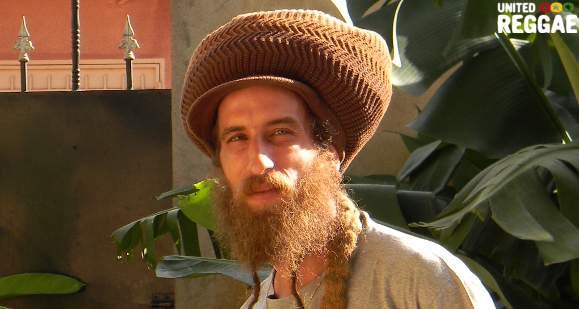
Ras Manjul, when did you start to do Reggae music?
I grew up in the seventies in Paris, and Reggae music was played everywhere in my district. I met a Rasta bredda when I was 13 years old. He had a studio at home. He showed me the way.
To which places did the road of life take you?
I moved from the 18th district of Paris to Mayotte. Africa was calling me from very long time, but I was not able, not ready to go there, so I decided to go to Mayotte first, which is close to La Reunion. I had family in La Reunion. And Mayotte is closer to African culture than Reunion. So it was a nice place for my Queen and me to discover ourselves and get closer to Africa. After three or four years there, music was calling me. I realized that Reggae music was my mission. In Mayotte, we were in the bush, very far from town, and it was hard to fulfill this mission. So I decided to move to La Reunion, where I was still in the bush, but we had electricity. I build my first little studio and started to work with many breddren there. After a few years of work, one of my Dub albums worked nice and opened the doors to Europe, so I went back there for six months to promote this album, Indian Ocean in Dub.
 Jah made me meet Sugar Minott, I worked with him on his album Leave Outta Babylon and toured with him
Jah made me meet Sugar Minott, I worked with him on his album Leave Outta Babylon and toured with him
I worked in many studios and met different artists. I went to London to work for Jamaican artists and producers. Jah made me meet Sugar Minott, I worked with him on his album Leave Outta Babylon and toured with him. That was a very nice experience. It showed me that I was able to lead an artist and show him how to sing and how to write songs. Then my wife and I decided to make our dream of repatriating to Africa a reality. We went to Mali and stayed there. We planted the seeds in solid foundation. I don’t want to move to any other place, c’est definitive, although only Jah knows. It’s a good place for my children to grow up, you know, it’s social living.
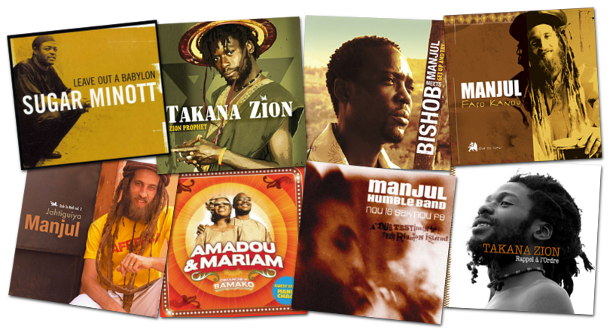
Does your life here live up to the expectations you had prior to your repatriation?
It’s better than that. I never really planned it. I was searching myself, too. I feel more in the hands of Jah in Africa, even though some things are harder, but I know there is a reason for everything. All my dreams are reality now.
You never think about returning to Europe?
Not really. I’ve spent as much time outside of Europe as in Europe. I’m not a man who says “I like this place, I hate that place”. I love the earth, cause Jah created the earth! My family and my music brought me to where I am now. My raison d’être is to be there and do what I do. So I continue that, it’s my satisfaction. No matter where I am, I don’t want to be anywhere else.
 I feel more in the hands of Jah in Africa, even though some things are harder
I feel more in the hands of Jah in Africa, even though some things are harder
What advice can you give to Rastas in the Caribbean who want to follow your example?
If somebody really feels it, he will know how to make it a reality. You have to be ready to do it. When you think it’s hard, it’s gonna be easy. When you think it’s easy, it’s gonna be hard. There are many parameters. But of course it’s really important for Rasta people to look to Africa. They need to come to Africa, work there and bring their power. Africa is Ithiopia. Those who repatriate benefit from it.
Have you had some formal education in music or sound engineering?
No. I learned it all with my eyes and my ears. That’s the best way to do it. 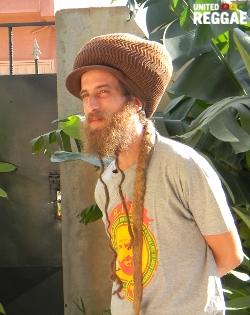 But you need to know what you like and what you don’t like. Otherwise, even if you can play everything, you’ll be handicapped.
But you need to know what you like and what you don’t like. Otherwise, even if you can play everything, you’ll be handicapped.
How is your studio set up?
The most important thing for me in the studio is the board, an Amek Big by Nieve and Longley. I work with analog hardware, I just removed the old 24-tracks because it was too expensive to maintain. I exchanged it with a PC four years ago. It has fast processors and good sound cards. The board is an analog one. I mostly work with equipment from the seventies and eighties. I was born with that, I won’t give it up. I’m keeping up the flag!
What are the principal differences between your studio and others in West Africa?
My studio is set up for live music. Drums and bass are especially important for me. It’s perfectly suited for seventies live music, for Reggae, Soul and traditional music. The other studios here work more with digital technology, they care about the software, but they have no boards, no periphery. There are different tools for different music. My studio is a Reggae studio, perfect for recording the music I love and listen to.
Do you prefer touring or working in your studio?
I prefer working in the studio, cause I’m in my yard with my family. But it’s important to tour and I love it, too, the vibes are nice. And I profit from my experiences on tour when I’m back in studio, cause I know better what works for the people. It’s like mixing medicines. If that is done in a laboratory only, you don’t know the medicine’s real effects on humans. You have to go out and test it, feel the effects and fine-tune it. It a science. Medicine and music is mystic. You have to feel and see the effects of your music.
Tell us about your label, Humble Ark.
It exists thanks to the success of Dub to Mali Vol. I – Faso Kanu, the album I recorded with people like Tiken Jah Fakoly and Amadou & Mariam. I took the name from my studio, it’s a tribute to Lee Perry. His music made me feel the power of the arc of the covenant. It let me feel my place as a Reggae musician and Dub master. The revenues of Dub to Mali gave me the opportunity to give breddren around me the chance to sing and present their work in Europe. This album really opened a lot of doors. Me is a family man. If someone brings food, I say don’t bring food just for me. If you bring food for my whole family, I will take it, if you can’t don’t bring it just for me. Before I founded my own label, I worked for a lot of singers and producers, but I was not the executive producer, just artistically. I started to produce executively artists like Takana Zion, Bishop, Natty Jean from Senegal and DJ Lion from Sierra Leone. Jah brought different breddren to my place, I really want to open doors for others with my works.
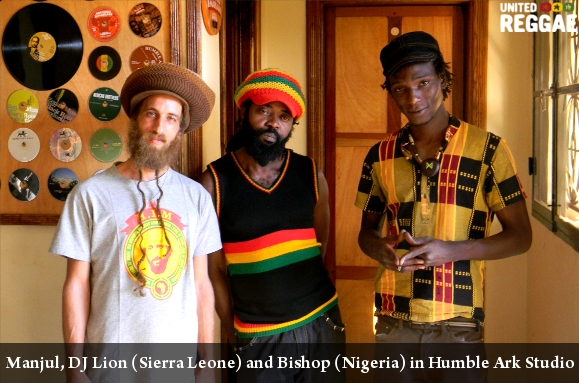
You’re the creator of a style called Roots Dub.
I’d describe it first as Rasta music. It can be Nyahbingi, Ska, or more like Rock. It always iron, wood and water things. I haffi feel the elements in music. I can record traditional music, too. Like that of Mali’s mystical hunters. But it’s always something we can call Rasta music. To be more precise, I do Roots Reggae, but in all kinds of patterns – Rockers, One Drop… We don’t do Steppers, it’s too urban, we don’t touch that very often.
What about Reggae music in Mali?
Reggae music is here in Mali from the beginning, it’s there in the traditional music. It was marginal for the people before it was linked to Rasta, to consciousness. But more and more, like in a lot of countries, there’s less confusion now. People really appreciate it now, they see the differences between artists and styles. They feel concerned, cause Reggae music is music for Africa and African music. I never saw a country where they respect Rasta people so much as in Mali. Even police, even military! So Reggae music is there, inside everyone. We just have to cultivate it. West Africa is all about Roots Reggae, only in the nightclubs they play Dancehall.
 I never saw a country where they respect Rasta people so much as in Mali
I never saw a country where they respect Rasta people so much as in Mali
Has the Reggae scene in West Africa grown in the last years?
Yeah, there’s been a real explosion. There are more and more artists. And everybody is coming here now. I feel it, everybody feels it. It will be really massive soon.
You won a gold CD for Amadou & Mariam’s album Dimanche à Bamako.
Exactly. Jah runs things mystically… I met their son, who does Rock music. Amadou & Mariam where looking for a studio to record the African parts of Dimanche à Bamako. 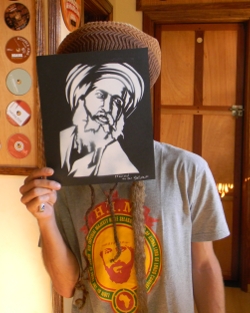 My studio was little at that time, but Amadou called me one day and asked about it. They sent someone to take a look at it and we agreed on working together. So we did the African parts here with them and Manu Chao. It was nice!
My studio was little at that time, but Amadou called me one day and asked about it. They sent someone to take a look at it and we agreed on working together. So we did the African parts here with them and Manu Chao. It was nice!
On which projects are you working at the moment?
I’m focusing on the third volume of Dub to Mali. The first and the second volume allowed me to present myself, Takana Zion, Bishop, Adama Yalomba and Assetou Kanuté. Now we work hard on the third volume to come back with a fresh sound to present new artists like Bishop, DJ Lion, Takana Zion and Natty Jean. We’re still in studio to finish things. Time will tell.
Read more about this topic
Read comments (2)
| Posted by chaliga mozee on 01.15.2011 | |
| Ras Manjul ni nomaaaaaaaaaaaaaaaa!!!!!!!!!!!!!!!!!!!!!!!! | |
| Posted by Ines AA on 09.02.2016 | |
| JAH bless! Greetings from Portugal! Love all Manjul work :) Love & respect |
|
Comments actually desactivated due to too much spams
Browse by categories
Recommended Articles
Latest articles
Recently addedView all
© 2007-2026 United Reggae. All Rights Reserved. Reproduction in whole or in part is prohibited. Read about copyright
Terms of use | About us | Contact us | Authors | Newsletter | A-Z














